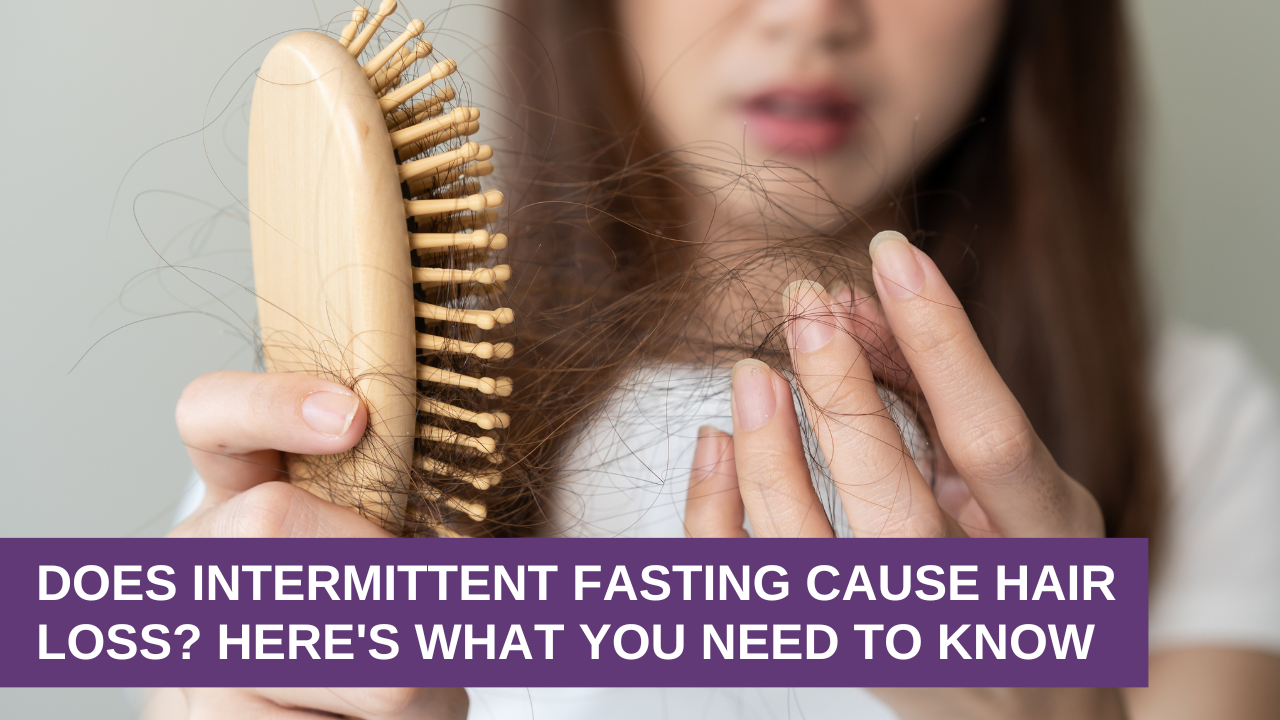Does Intermittent Fasting Cause Hair Loss?
Let’s talk about it.
Intermittent fasting has gained global popularity to help with weight loss, increase metabolism perhaps even increase longevity but some people have noticed hair loss.
Intermittent fasting means not eating for a certain period of time during the day with the food consumption window abbreviated to 4 to 8 hours. The longer the fasting, the more effect on your body, including your hair follicles.
Intermittent fasting has helped some people with weight management, improved insulin sensitivity, and reduced inflammation, which may increase longevity. Yet people, especially women, notice increased hair loss and slowed hair growth to the point of alopecia.
To understand how intermittent fasting causes hair loss you need to understand the hair growth cycle.
The first three phases — anagen, catagen, and telogen — cover the growth and maturation of hair. Anagen is the active phase of hair growth. Catagen is a transition phase where hair growth stops and the hair separates from the follicle. Telegen is the resting phase when hair doesn’t grow. During the final, or exogen, phase, “old” hair sheds, though usually, a new hair is getting ready to take its place in the follicle.
Hair follicles are where stem cells initiate new hair growth. Hormones specifically T3 and estrogen stimulate hair follicle stem cells. Male hormones specifically dihydrotestosterone inhibit hair follicle stem cells. There must be just enough insulin to escort glucose into the cell to create enough energy to grow hair. Too much insulin can create insulin resistance in the follicle and prevent hair growth. Hair follicle stem cells are highly sensitive to nutritional levels, stress levels, and hormonal changes.
Intermittent fasting creates sudden changes in calorie intake and nutrition which can cause telogen effluvium — a kind of shock that causes temporary hair loss due to a hormonal imbalance. As a result, intermittent fasting is actually more likely to trigger hair loss than promote hair growth.
Prolonged intermittent fasting leads to reduced calorie or nutrient intake so hair follicles may not receive enough energy and micronutrients (vitamins and minerals) to promote growth.
While intermittent fasting can lower insulin, it can also lower thyroid function. Thyroid hormone, particularly T3, is critical to stimulate hair follicle stem cells.
Prolonged fasting can lower sex steroids particularly estrogen which is critical to hair growth.
Fasting can be a physical stressor.
For some women, stress triggers temporary shedding due to the body prioritizing essential functions over hair growth.
A recently released randomized clinical trial has revealed how intermittent fasting induces hair loss. Intermittent fasting inhibits human hair follicle regeneration by selectively inducing apoptosis (cell death) in activated hair follicle stem cells.
The loss of hair is independent of calorie reduction, circadian rhythm alterations, or the cellular nutrient-sensing mechanism. This means that no matter how many nutrient-dense calories you’re consuming or when you’re eating – repeated periods of fasting can create shock-stress-induced hair loss.
Fasting activates crosstalk between adrenal glands and dermal adipocytes in the skin. These skin fat cells rapidly release free fatty acids into the follicle, which in turn disrupts the normal metabolism of hair follicle stem cells, causing oxidative damage and death of the hair follicle stem cells- leading to hair loss.
When you’re fasting, your hypothalamus triggers, your adrenal glands to produce cortisol in order to release sugar to feed vital organs like the brain, kidneys, liver, and heart. Prolonged cortisol exposure causes inflammation, and ultimately that is what destroys the embryonic hair follicle, causing hair loss.
If you choose intermittent fasting as a means to lose weight or decrease insulin resistance, I recommend protecting your hair by:
- Circadian Fasting: Fasting during dark creates less stress and hormonal imbalances. Focus on eating nothing from dusk to dawn.
- Increase your Nutrient-Dense Eating Windows: Ensure meals include healthy fats, proteins, and key micronutrients (like iron, zinc, vitamin C, biotin, and omega-3s).
- Support Hormonal Balance: Optimizing hypothalamus function improves thyroid, adrenal and sex hormones to promote healthy hair growth. Incorporate Genesis Gold® to provide comprehensive hypothalamus and hormone support.
- Avoid Over-Fasting: Stick to moderate fasting schedules (12-14 hours) if hair loss is a concern.
- Manage Stress: Practice mindfulness, gentle exercise, and self-care to minimize the stress response.
Maintaining a balanced approach to intermittent fasting can improve your health and save your hair.
Genesis Gold® helps support hypothalamus health, promoting hormonal balance and nutrient absorption.
You can learn more about hormones and hair health in our free Hormone Reboot Training. Your health journey shouldn’t cost you your hair – let’s find the right balance together.




0 Comments